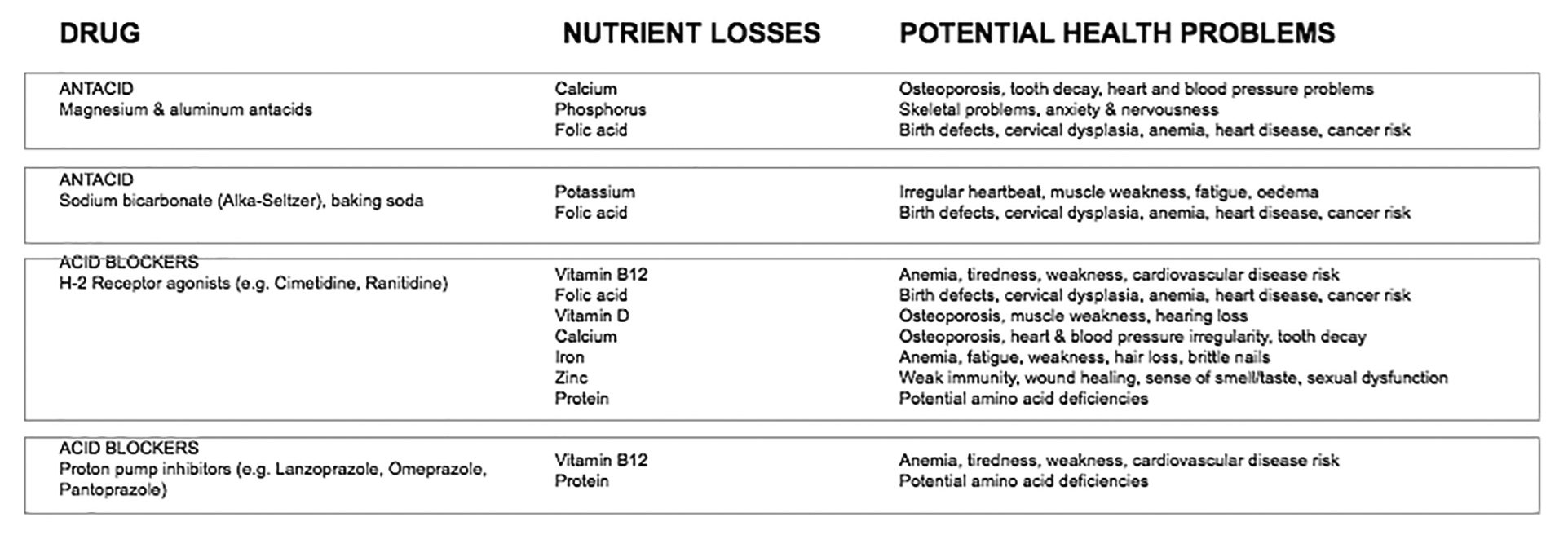
How Antacid & Acid Blocking Medications Cause Nutrient Deficiencies
Antacids, acid blocking drugs and nutrient deficiencies
Millions of people take over the counter antacids, or more potent prescription acid blocking medications such as proton pump inhibitors to deal with acid reflux and gastro-esophageal reflux disease.
In the short-term, these meds can do a great job of reducing unwanted and uncomfortable symptoms, but in the long run they may deplete nutrients and trigger Candida, small intestinal bacterial overgrowth and C. difficile infections. The net result can be bloating, gas, loose stools, diarrhea, fatigue, depression, allergies and other unpleasant symptoms.
If you are taking antacids, H2 blockers or PPIs on an ongoing basis, perhaps it’s worth considering the info below because your long term health may be at stake.
According to pharmacists Ross Pelton and James B. Lavalle, antacids and acid blocking medications lead to significant nutritional deficiencies.Their book, The Nutritional Cost of Prescription Drugs, outlines some of the nutrients that become depleted through the long term suppression of stomach acid. The table below summarises Pelton and Lavalle’s findings.
NUTRIENT DEFICIENCIES WITH ACID BLOCKERS

References:

This is only a partial list of symptoms and conditions associated with antacid-induced nutrient loss. For example, in addition to the symptoms listed in the table, vitamin B12 deficiency is associated with headaches, migraines, balance problems, poor memory and concentration, and dementia.
The work of Pelton and Lavalle is echoed by Jonathan Wright M.D. and Lane Lenard M.D., whose book, Why Stomach Acid Is Good For You contains 200-plus pages of information about why we shouldn’t block stomach acid production for too long. The possible consequences of nutrient depletion arising from long-term antacid and acid blocker drug use are far-reaching and clear for everyone to see.
Why do these nutrient deficiencies develop?
The answer is very simple: we need stomach acid to digest food and release nutrients so they can be absorbed into the body. Without stomach acid, we can’t digest food properly!
Not only does this lead to nutrient depletion over time, but it also makes it much easier for microbes such as H. pylori, Candida and SIBO to overgrow and cause problems.
Stomach acid also triggers digestive enzyme release from the pancreas and bile release from the gallbladder, which also play crucial roles in digestion. When stomach acid is suppressed, bile and pancreatic enzyme levels can also drop, leading to yet more problems.
Low stomach acid and chronic digestive infections (bad bugs)
As you may know, your digestive system plays host to trillions of microbes, collectively known as your microbiome. Most of these microbes are harmless and are absolutely necessary for optimal health, not only of your digestive system but also of your entire body.
However, when your digestive environment changes due to low stomach acid and poor pancreas, liver and gallbladder function, it becomes favourable for bad bugs to overgrow.
For example:
- Candida has been shown to proliferate in the stomach within 48 hours of taking acid blocking medications
- Low stomach acid is one of the main risk factors for developing small intestinal bacterial overgrowth (SIBO)
- Low stomach acid increases the risk of Clostridium difficile infection, which causes diarrhoea, cramping and other digestive symptoms (it can be very dangerous for elderly people and children)
- Low stomach acid makes it easier for H. pylori to survive in the stomach
Article written by Dave Hompes
To read this article in full, visit the original source here:
http://www.h-pylori-symptoms.
Photo credit: https://authoritynutrition.
